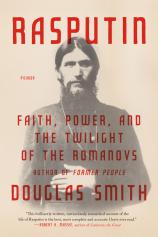Rasputin: Faith, Power, and the Twilight of the Romanovs
Review
Rasputin: Faith, Power, and the Twilight of the Romanovs
Like many of the legends that grew up around Grigory Yefimovich Rasputin, the peasant from Pokrovskoe, the story of his immortality --- perhaps his greatest claim to fame --- is more fiction than fact. In RASPUTIN: Faith, Power, and the Twilight of the Romanovs, author Douglas Smith attempts to separate man from myth, ultimately settling on elucidating his years of involvement with the royal family via the legends that swirled around him.
Unfortunately, you have a relatively naive reviewer, so I cannot say if this book holds up to its claim to be the definitive account of Rasputin’s life. Certainly, the history is incredibly detailed, providing significant information gleaned from previously unseen sources, including documents sealed away in archives that had been inaccessible to the public until recently. Many primary sources are personal items --- the letters, telegrams and diaries of those close to Rasputin and the Romanovs, as well as missives from the subjects themselves.
"[T]he history is incredibly detailed, providing significant information gleaned from previously unseen sources, including documents sealed away in archives that had been inaccessible to the public until recently."
Douglas delivers a lucid vision of the palace’s atmosphere of intrigue and conspiracy that will appeal to readers, regardless of their background in the subject. This ambiance made Rasputin a dangerous figure whether or not his influence over the Romanovs was as great as perceived. Douglas relentlessly details the reactions of powerful individuals to Rasputin: those who found themselves drawn to him, those who were repulsed by someone they perceived to be a manipulative crook, and those who felt in him the presence of the devil.
Certain themes prevail throughout the book: the question of Rasputin’s khlyst (a Russian non-Orthodox Christian sect) connections, his sexual prowess and generally debauched nature, and the hypnotic abilities that buoyed his intimate relations with the Romanov family. Douglas unveils many denunciations and charges over the years that he believes have little to no foundation in reality.
It does seem that Rasputin was doing a fair amount of kissing and bathing with members of the opposite sex. Likely too that some of these relations were sexual in nature. But the criminal and corrupt activities ascribed to the mystical figure seem for the most part unfounded, and it is highly unlikely that Rasputin had any kind of sexual relationship with Tsarina Alexandra or her daughters.
More likely, Rasputin was a man of unusual magnetism who took advantage of opportunities provided him to get closer to power. It seems that his motivating religiosity, though unorthodox and often straying from church teachings, was sincere. The book includes an image of the heads of the Tsar, Tsarina and Rasputin in one, meant to show that Rasputin and Alexandra were the true masterminds behind Nicholas’ rule. What it also reveals are three people who believed they had a mandate from heaven that would protect them against the will of a people.
It’s extraordinary to realize the level of Russian hysteria surrounding Rasputin and the unwillingness of its ruling family to see it. Government officials, members of the clergy, nobility and others from all walks of life fed the fear of Rasputin, weaving a web of suspicion that wouldn’t be ignored. At a time in our political history when facts seem less relevant than perception, we must find a way to acknowledge widely held beliefs we would much rather dismiss as madness.
Reviewed by Rebecca Kilberg on January 6, 2017
Rasputin: Faith, Power, and the Twilight of the Romanovs
- Publication Date: November 7, 2017
- Genres: Biography, History, Nonfiction
- Paperback: 880 pages
- Publisher: Picador
- ISBN-10: 1250141265
- ISBN-13: 9781250141262





